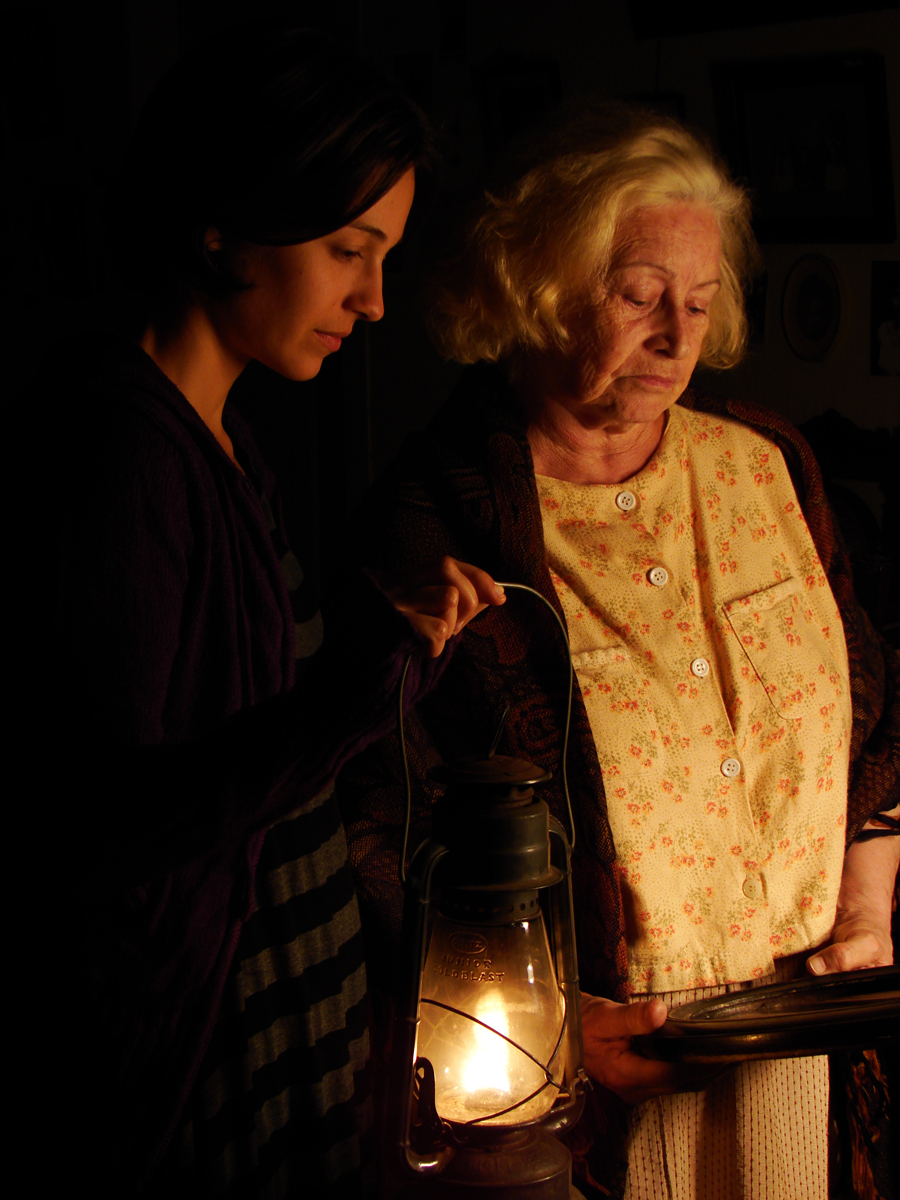The young Brazilian filmmaker Julia Murat explains that the original idea for Found Memories came to her in 1999, while she was working on a film being shot in a village with a closed cemetery. The coffins of those who died in the vicinity had to travel seven hours by boat to be buried. This Faulkner-esque quandary intrigued her, and made her wonder what kind of story she could tell about a town where a locked graveyard made it impossible to die.
“Found Memories”, un film de Julia Murat, 2011 | Drame | vo portugais st anglais| Distribution Film Movement (www.filmmovement.com)
A sealed cemetery is indeed central to this mesmerizing film, which is about life and death but also, and ultimately, about time. It is set in a fictional village named Jotubaba, in a region of Brazil that bustled with the coffee trade in the 19th century but is now only a ghost of its former self. Trains have ceased to run on the overgrown tracks; the town is impoverished, cut off and populated only by old people bound together by their land and their daily routines. As the film begins, Madalena (Sonia Guedes) makes bread before dawn (in a darkness illuminated only by Carravagio-esque gas light) and follows the old train tracks to deliver her rolls to Antonio’s (Luiz Serra’s) coffee shop. The two of them drink coffee and banter, go to mass and then break bread with their neighbors. In the afternoon, the men play games and Madalena walks home, to write yet another letter to her dead husband before she goes to sleep.
This sequence repeats itself a number of times during the film, with slight variations. The days blend into each other, and ritualized time seems frozen on eternal return. It must be said that the English title, Found Memories, is a weak translation of the original Portuguese Historias Que So Existem Quando Lembradas: “Stories That Only Exist When Remembered.” This more nuanced title moves the film towards the retrospective, emphasizing the townspeople’s insistence on clinging to the traditions that contain their memories of the past and those who have peopled it. It also highlights the importance of the arrival of young Rita (Lisa E. Favero), an itinerant photographer fascinated by the decadence of the old plantation towns who, by following the train tracks, ends up one day at Madalena’s doorstep. Rita moves in with Madalena for a short stay, and in so doing she becomes the witness, the key to the preservation of the town and its people: their images, their stories and ultimately their social fabric. Armed with an IPOD and a digital camera, she quietly shatters the complacency of Jotubaba while fitting herself seamlessly into its routines. Her presence brings music, dancing, technology, youth – in short, movement – into the town, a gift that is beautifully embodied by subtle shifts in the film’s visual montage.
As this shift makes clear, visual language is an essential part of the storytelling in Found Memories. The beginning of the film is especially slow and static; the camera lingers on long shots that frame painterly, highly composed scenes, and it never budges when small people pass in front of the lens to momentarily populate their environment. The camera never moves while Madalena walks on the tracks; it frames her encounters with Antonio from afar, in classically balanced compositions that imbue a decaying wall and bench with the stillness and weightiness of a Vermeer. My favorite shot is an early exterior view of the cemetery where Madalena’s husband is buried, and from which she is excluded by a rusty lock. Seen from afar and wide-angle, the vista is filled with flowers. But the daily tasks – sweeping, pruning and planting – that mark Madelena’s days and link her life to her husband’s memory are small gestures in a much bigger and more impersonal picture.
The camera does not begin to move until Rita enters the picture, when cuts, jumps and varied points of view suddenly enliven our field of vision. Rita, however, arrives not only with her contemporary attitudes and equipment but also with a primitive pinhole camera; as Madalena laughingly remarks, she carries fancy machines with flashing lights and also a can. Asked why she is so fascinated by “old stuff,” Rita sighs and admits that she was born into the wrong time, but we never get answers to the riddle of her life. She comes from nowhere, belongs nowhere, so she and her camera function like spiritual messengers, harbingers of both life and death for the town. Her black-and-white pinhole photographs, shadowy, static and full of ghosts, are the still points in the turning world of the cinematic narrative. People might “forget” to die in the village, as Antonio says, but they become phantoms when frozen by her long exposure times. In looking forward, Rita also points backward; in moving, she recreates stillness. This temporal push and pull, on both narrative and formal levels, drives the story along to its conclusion.
Found Memories was selected for the New Directors/New Films series shown at Lincoln Center and the Museum of Modern Art last spring, and it opened this summer in New York on a limited release. It is a film about tradition and modernity, about stasis and change, about the waxing and waning of fortunes, history and the generations. But it is also a film about pictures, what they mean and how they embody our relationship to life, love, land and time. A purely Brazilian tale, it nevertheless speaks to us all about the simple pleasures, hardships and paradoxes of lives lived well or badly — but always, by necessity, together. I cannot say enough about this stunning film by a young woman with a soul both old and wise.
(Please note that this film, under the title “Historias: Des histoires qui n’existent que lorsque l’on s’en souvient,” opened in Paris on July 18.)
SR
© Shelley Rice, 2012


